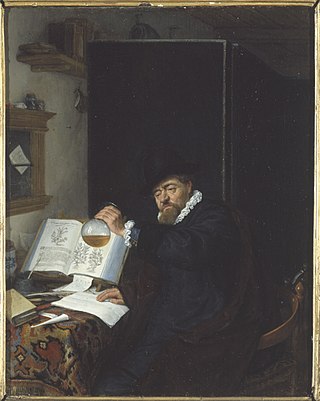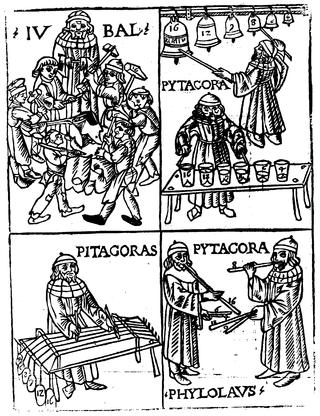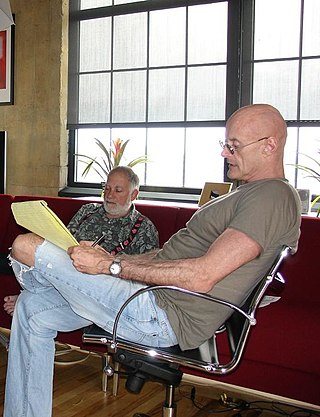
Analysis is the process of breaking a complex topic or substance into smaller parts in order to gain a better understanding of it. The technique has been applied in the study of mathematics and logic since before Aristotle, though analysis as a formal concept is a relatively recent development.
Aesthetics is the branch of philosophy concerned with the nature of beauty and the nature of taste; and functions as the philosophy of art. Aesthetics examines the philosophy of aesthetic value, which is determined by critical judgments of artistic taste; thus, the function of aesthetics is the "critical reflection on art, culture and nature".
Musicology is the scholarly study of music. Musicology research combines and intersects with many fields, including psychology, sociology, acoustics, neurology, natural sciences, formal sciences and computer science.

Music theory is the study of the practices and possibilities of music. The Oxford Companion to Music describes three interrelated uses of the term "music theory": The first is the "rudiments", that are needed to understand music notation ; the second is learning scholars' views on music from antiquity to the present; the third is a sub-topic of musicology that "seeks to define processes and general principles in music". The musicological approach to theory differs from music analysis "in that it takes as its starting-point not the individual work or performance but the fundamental materials from which it is built."

Kenneth Earl Wilber II is an American theorist and writer on transpersonal psychology and his own integral theory, a four-quadrant grid which purports to encompass all human knowledge and experience.

In politics, integralism, integrationism or integrism is an interpretation of Catholic social teaching that argues the principle that the Catholic faith should be the basis of public law and public policy within civil society, wherever the preponderance of Catholics within that society makes this possible. Integralism is anti-pluralist, seeking the Catholic faith to be dominant in civil and religious matters. Integralists uphold the 1864 definition of Pope Pius IX in Quanta cura that the religious neutrality of the civil power cannot be embraced as an ideal situation and the doctrine of Leo XIII in Immortale Dei on the religious obligations of states. In December 1965, the Second Vatican Council approved and Pope Paul VI promulgated the document Dignitatis humanae–the Council's "Declaration on Religious Freedom"–which states that it "leaves untouched traditional Catholic doctrine on the moral duty of men and societies toward the true religion and toward the one Church of Christ". However, they have simultaneously declared "that the human person has a right to religious freedom," a move that some traditionalist Catholics such as Archbishop Marcel Lefebvre, the founder of the Society of St. Pius X, have argued is at odds with previous doctrinal pronouncements.

Aesthetics of music is a branch of philosophy that deals with the nature of art, beauty and taste in music, and with the creation or appreciation of beauty in music. In the pre-modern tradition, the aesthetics of music or musical aesthetics explored the mathematical and cosmological dimensions of rhythmic and harmonic organization. In the eighteenth century, focus shifted to the experience of hearing music, and thus to questions about its beauty and human enjoyment of music. The origin of this philosophic shift is sometimes attributed to Baumgarten in the 18th century, followed by Kant.
The Leroy P. Steele Prizes are awarded every year by the American Mathematical Society, for distinguished research work and writing in the field of mathematics. Since 1993, there has been a formal division into three categories.
Integral is a concept in calculus.

In physics, physical optics, or wave optics, is the branch of optics that studies interference, diffraction, polarization, and other phenomena for which the ray approximation of geometric optics is not valid. This usage tends not to include effects such as quantum noise in optical communication, which is studied in the sub-branch of coherence theory.
David Benjamin Lewin was an American music theorist, music critic and composer. Called "the most original and far-ranging theorist of his generation", he did his most influential theoretical work on the development of transformational theory, which involves the application of mathematical group theory to music.
Music psychology, or the psychology of music, may be regarded as a branch of both psychology and musicology. It aims to explain and understand musical behaviour and experience, including the processes through which music is perceived, created, responded to, and incorporated into everyday life. Modern music psychology is primarily empirical; its knowledge tends to advance on the basis of interpretations of data collected by systematic observation of and interaction with human participants. Music psychology is a field of research with practical relevance for many areas, including music performance, composition, education, criticism, and therapy, as well as investigations of human attitude, skill, performance, intelligence, creativity, and social behavior.

Gabriel Pareyon is a polymathic Mexican composer and musicologist, who has published literature on topics of philosophy and semiotics.

Heliopolis University is a non-profit university in Egypt with the mission of sustainable development. In Fall 2018, Heliopolis University had around 1,700 students in five faculties.

Geissenklösterle is an archaeological site of significance for the central European Upper Paleolithic, located near the town of Blaubeuren in the Swabian Jura in Baden-Württemberg, southern Germany. First explored in 1963, the cave contains traces of early prehistoric art from between 43,000 and 30,000 years ago, including some of the oldest-known musical instruments and several animal figurines. Because of the historical and cultural importance of these findings, in 2017 the site became part of the UNESCO World Heritage Site Caves and Ice Age Art in the Swabian Jura.
The Journal of Music Theory is a peer-reviewed academic journal specializing in music theory and analysis. It was established by David Kraehenbuehl in 1957.
Integral theory as developed by Ken Wilber is a synthetic metatheory aiming to unify a broad spectrum of Western theories and models and Eastern meditative traditions within a singular conceptual framework. The original basis, which dates to the 1970s, is the concept of a "spectrum of consciousness" that ranges from archaic consciousness to the highest form of spiritual consciousness, depicting it as an evolutionary developmental model. This model incorporates stages of development as described in structural developmental stage theories, as well as eastern meditative traditions and models of spiritual growth, and a variety of psychic and supernatural experiences.
Gary Alfred Tomlinson is an American musicologist and Sterling Professor of Music and Humanities at Yale University. He was formerly the Annenberg Professor in the Humanities at the University of Pennsylvania. He graduated from the University of California, Berkeley, with a Ph.D., in 1979 with thesis titled Rinuccini, Peri, Monteverdi, and the humanist heritage of opera.
William E. Caplin is an American music theorist who lives and works in Montreal, Quebec, Canada, where he is a James McGill Professor at the Schulich School of Music of McGill University. Caplin served as president of the Society for Music Theory from 2005 to 2007 and was its vice-president from 2001 to 2003. His earlier work concentrated on the history of music theory, but he is best known for a series of articles and two books on musical form in European music around 1800. The first of those books, Classical Form: A Theory of Formal Functions for the Music of Haydn, Mozart, and Beethoven has been widely influential and was a major factor in the revival of interest in musical form in North-American music theory.
Spiral Dynamics (SD) is a model of the evolutionary development of individuals, organizations, and societies. It was initially developed by Don Edward Beck and Christopher Cowan based on the emergent cyclical theory of Clare W. Graves, combined with memetics. A later collaboration between Beck and Ken Wilber produced Spiral Dynamics Integral (SDi). Several variations of Spiral Dynamics continue to exist, both independently and incorporated into or drawing on Wilber's Integral theory. Spiral Dynamics has applications in management theory and business ethics, and as an example of applied memetics. However, it lacks mainstream academic support.








